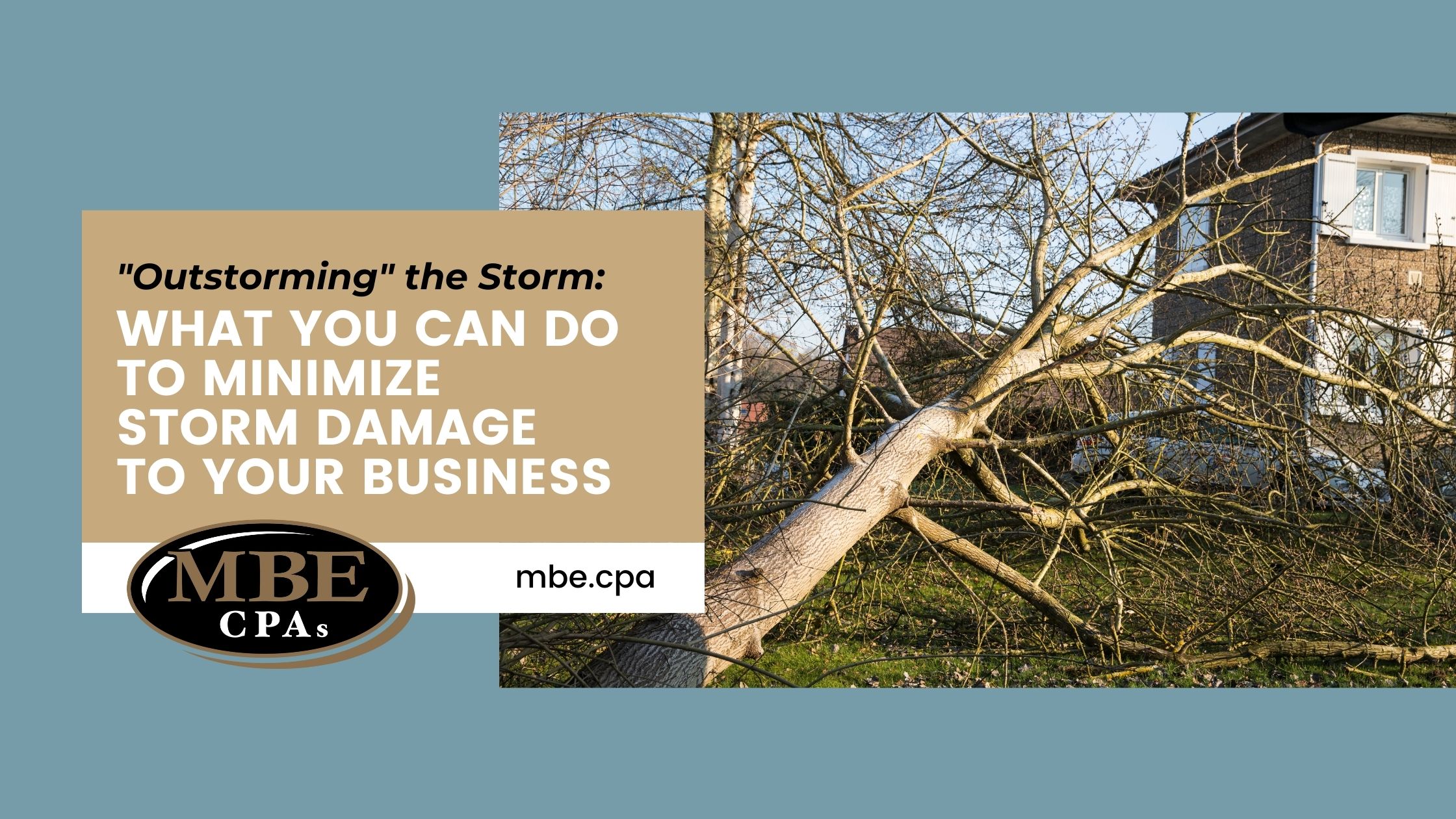“Outstorming” the Storm

What You Can Do to Minimize Storm Damage to Your Business
If there’s anything predictable about a storm, it’s the damage that it leaves behind: uprooted or fallen trees, destroyed roofs, water damage, loss of power, and the list goes on and on.
So what should you do if you were just hit hard by a storm or how do prepare if one comes thundering through in the future? Our CPA business advisors are here to help you “Outstorm” it. They’ve compiled a few actions you can take in reaction to storm damage and how to mitigate financial losses now and in the future.
Here’s What to Do if You Recently Suffered Storm Damage:
Step 1: Call your insurance agent.
It’s important to inform your insurance agent of any damage to your business as soon as possible. It could take a couple of days to get the damage inspected, so you’ll want to let them know right away so you aren’t waiting even longer for it to be repaired.
Step 2: Take pictures of all the damages sustained by your business.
Before you begin cleaning up, make sure to document all visible damages suffered by your business. Be sure to document all physical damage, technical damage, loss of items, and any damage that affects your ability to operate.
Step 3: Keep receipts of all expenses from repairs.
You can deduct the cost of any repairs less the insurance deductible from your taxes. Keep receipts of all expenses from repairs, relocation expenses, and advertising fees if you temporarily move your business while repairs are ongoing. This also includes receipts of any amount spent on temporary fixes needed to minimize more damage while you are waiting on contractors to completely repair the damage.
Step 4: Check to see if your insurance policy covers the loss of income.
If your insurance policy includes Business Interruption Insurance, also known as Business Income Insurance, you may be reimbursed for operating expenses and lost income after a disaster. If you aren’t sure if this is covered by your insurance give your agent a call to look into it for you.
How to be Proactive for the Future:
If a recent storm left you pondering whether you have done enough to protect your business from the long-term impact, our business advisors have a few tips for you to get started:
1. Review your insurance coverage.
Consult your insurance agent to ensure that your business is insured high enough and if you need to make any adjustments. Consider if your policy covers all possible loss, damage, liability, and the cost of your deductible.
2. Take photos of all of your assets, and don’t rely on depreciation schedules.
Due to tax law changes, depreciation schedules have increased the value requirement to potentially replace any damaged items. If any assets fall under that value threshold then they may not be accounted for by your insurance as something that needs to be replaced.
We suggest you make take inventory and photograph all your assets as the cost of replacing them may not be reflected properly by the depreciation schedule.
3. Establish a disaster recovery plan.
Consider drafting a list of procedures and action items, in order of what needs to be done and who to contact, if your business is affected by storm damage in the future.
4. Secure important documents.
Keep your insurance policies, point of contact information, and other important documents in a safe and secure place so they’re easily accessible in the future.
5. Develop a business continuity plan.
Plan how you intend to continue your operations in case of any physical damage in your office or place of business, or technical malfunction in your hardware and software. Identify the critical systems and processes that must be sustained and establish temporary alternative guidelines and procedures until your business has fully recovered.
6. Set up programs to help the community.
It’s the timeless ideology, treat others as you would want to be treated. The hardship of having a storm rip through your community can be felt by everyone. As much as your business’ recovery is a priority, keeping others in your community afloat after a disaster is also crucial. Consider holding fundraisers, making monetary or material donations, and volunteering your time and resources to help clear trees, secure structures, and lend a hand.
Disasters such as storms can deal massive blows to your business and community. Although inevitable, preparation can help you soften the impact and have your doors open for business again quickly.
At MBE CPAs, our business advisors can help you “outstorm” the storm. Talk to us today and we’ll help you set up your disaster recovery plan, business continuity plan, give you advice on tax credits, research funding, community assistance programs, and more!
